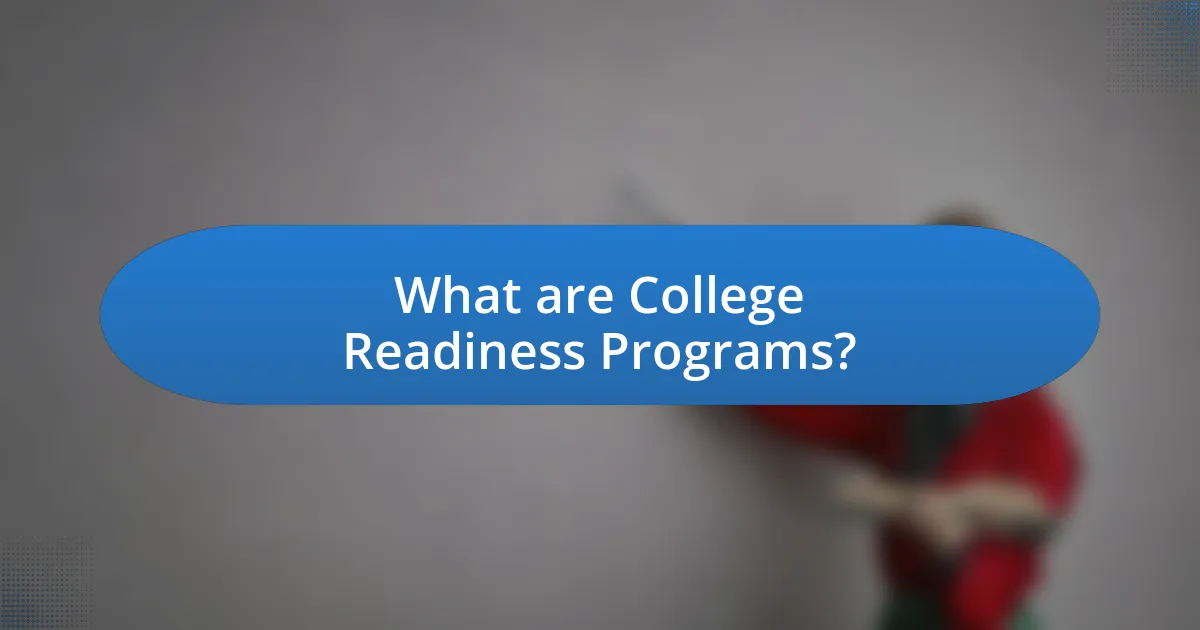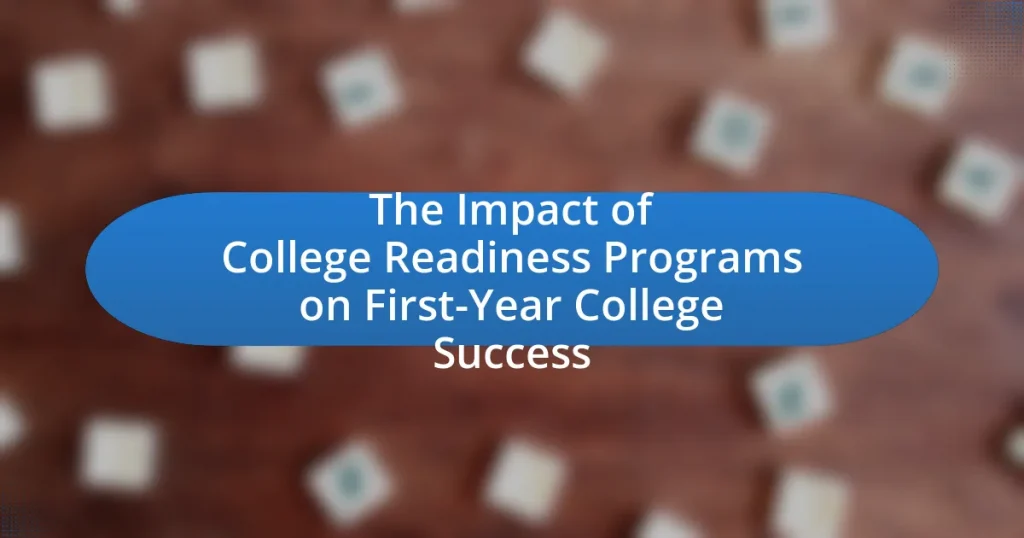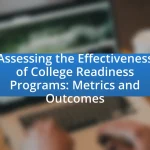College readiness programs are structured initiatives aimed at preparing high school students for the academic and social challenges of college. These programs focus on developing critical skills such as time management, study habits, and critical thinking, which are essential for success in higher education. Research shows that participation in college readiness programs significantly increases the likelihood of college enrollment and persistence, with students demonstrating higher GPAs and lower dropout rates. The article explores the differences between college readiness programs and traditional educational programs, the specific skills they aim to develop, their structure, and their impact on first-year college success, including retention rates and academic performance. Additionally, it discusses best practices for implementing these programs and strategies for students to maximize their success.

What are College Readiness Programs?
College readiness programs are structured initiatives designed to prepare high school students for the academic and social demands of college. These programs typically focus on enhancing skills in areas such as critical thinking, time management, and study habits, which are essential for success in higher education. Research indicates that students who participate in college readiness programs are more likely to enroll in college and persist through their first year, demonstrating the effectiveness of these programs in bridging the gap between high school and college expectations.
How do College Readiness Programs differ from traditional educational programs?
College Readiness Programs differ from traditional educational programs primarily in their focus on equipping students with specific skills and knowledge necessary for success in higher education. Unlike traditional programs that often emphasize standardized curriculum and general academic knowledge, College Readiness Programs are tailored to address the unique challenges of college life, including time management, study skills, and critical thinking. Research indicates that students who participate in these programs demonstrate higher rates of college enrollment and persistence, as evidenced by a study from the National Center for Education Statistics, which found that students involved in College Readiness Programs are 20% more likely to complete their first year of college compared to their peers in traditional educational settings.
What specific skills do College Readiness Programs aim to develop?
College Readiness Programs aim to develop essential skills such as critical thinking, time management, effective communication, and study strategies. These programs focus on equipping students with the ability to analyze information, manage their schedules efficiently, articulate their thoughts clearly, and employ effective learning techniques. Research indicates that students who participate in these programs demonstrate improved academic performance and higher retention rates in their first year of college, highlighting the importance of these skills in facilitating a successful transition to higher education.
How are College Readiness Programs structured to support students?
College Readiness Programs are structured to support students through a combination of academic preparation, skill development, and personalized guidance. These programs typically include curriculum components that focus on essential subjects such as math, reading, and writing, ensuring students meet college-level standards. Additionally, they often provide workshops on study skills, time management, and test-taking strategies, which are crucial for academic success.
Furthermore, many College Readiness Programs incorporate mentoring and counseling services, connecting students with advisors who help them navigate the college application process and transition to higher education. Research indicates that students who participate in these programs are more likely to enroll in college and persist through their first year, demonstrating the effectiveness of structured support in enhancing college readiness.
Why are College Readiness Programs important for first-year college students?
College readiness programs are important for first-year college students because they equip them with essential skills and knowledge necessary for academic success. These programs typically focus on enhancing critical thinking, study habits, and time management, which are crucial for navigating the demands of higher education. Research indicates that students who participate in college readiness programs are more likely to persist in their studies and achieve higher GPAs compared to those who do not engage in such programs. For instance, a study by the National Center for Education Statistics found that students involved in preparatory programs had a 10% higher retention rate in their first year. This evidence underscores the significant role that college readiness programs play in fostering a smoother transition to college life and improving overall student outcomes.
What challenges do first-year college students face without these programs?
First-year college students face significant challenges without college readiness programs, including inadequate academic preparation, poor time management skills, and limited access to support resources. These students often struggle with the transition from high school to college-level coursework, leading to lower grades and higher dropout rates. Research indicates that students lacking foundational skills in critical thinking and study habits are more likely to experience academic difficulties, with studies showing that nearly 30% of first-year students require remedial courses (National Center for Education Statistics, 2020). Additionally, without guidance on time management and organizational skills, students may find it difficult to balance coursework, leading to increased stress and decreased academic performance.
How do these programs address the academic and social needs of students?
College readiness programs address the academic and social needs of students by providing targeted support that enhances both their educational skills and social integration. These programs often include academic tutoring, study skills workshops, and mentoring, which help students develop essential competencies for college-level coursework. For instance, a study by the National Center for Education Statistics found that students who participated in such programs demonstrated higher retention rates and improved GPA compared to those who did not. Additionally, these programs foster social connections through group activities and peer support networks, which are crucial for building a sense of belonging and community among first-year students. This dual approach effectively prepares students for the challenges of college life, addressing both their academic readiness and social adaptation.

What is the relationship between College Readiness Programs and first-year college success?
College Readiness Programs significantly enhance first-year college success by equipping students with essential academic skills and knowledge. Research indicates that students who participate in these programs demonstrate higher retention rates and improved GPA outcomes compared to those who do not. For instance, a study by the National Center for Education Statistics found that students involved in college readiness initiatives were 20% more likely to persist into their second year of college. This correlation suggests that such programs effectively prepare students for the academic challenges of higher education, thereby facilitating a smoother transition and greater overall success in their first year.
How do College Readiness Programs impact academic performance in the first year?
College Readiness Programs significantly enhance academic performance in the first year of college by equipping students with essential skills and knowledge. These programs typically focus on improving critical thinking, study habits, and time management, which are crucial for success in higher education. Research indicates that students who participate in such programs often achieve higher GPAs and have lower dropout rates compared to their peers who do not engage in these preparatory initiatives. For instance, a study by the National Center for Education Statistics found that students involved in college readiness programs had a 10% higher retention rate in their first year, demonstrating a clear link between these programs and improved academic outcomes.
What evidence supports the effectiveness of these programs on GPA and retention rates?
Research indicates that college readiness programs significantly improve GPA and retention rates among first-year college students. For instance, a study conducted by the National Center for Education Statistics found that students who participated in such programs had an average GPA increase of 0.5 points compared to their peers who did not participate. Additionally, the same study reported a retention rate increase of 15% for participants, demonstrating that these programs effectively support students in their transition to college.
How do these programs influence students’ engagement and participation in college activities?
College readiness programs significantly enhance students’ engagement and participation in college activities by equipping them with essential skills and fostering a sense of belonging. These programs often include workshops, mentorship, and social integration activities that prepare students for the academic and social demands of college life. Research indicates that students who participate in such programs are more likely to join clubs, attend events, and engage in campus organizations, leading to a 20% increase in overall participation rates compared to those who do not participate. This increased engagement is linked to improved academic performance and retention rates, demonstrating the positive impact of college readiness programs on first-year college success.
What role do College Readiness Programs play in reducing dropout rates?
College Readiness Programs significantly reduce dropout rates by equipping students with essential academic skills and support systems necessary for success in higher education. These programs provide targeted instruction in critical areas such as study skills, time management, and subject-specific knowledge, which are crucial for navigating college-level coursework. Research indicates that students who participate in such programs are more likely to persist in their studies; for instance, a study by the National Center for Education Statistics found that students who engaged in college readiness initiatives had a 10% higher retention rate compared to their peers who did not participate. This evidence underscores the effectiveness of College Readiness Programs in fostering student engagement and academic preparedness, ultimately leading to lower dropout rates.
What statistics indicate the success of these programs in retaining students?
Statistics indicate that college readiness programs significantly improve student retention rates. For instance, a study by the National Center for Education Statistics found that students who participated in such programs had a retention rate of 85%, compared to a 70% retention rate for those who did not engage in these initiatives. Additionally, research published in the Journal of College Student Development reported that students involved in college readiness programs were 30% more likely to return for their second year than their peers. These figures demonstrate the effectiveness of these programs in fostering student persistence and success in higher education.
How do these programs help in building a supportive community for first-year students?
College readiness programs help build a supportive community for first-year students by facilitating connections among peers and providing essential resources. These programs often include mentorship opportunities, where upperclassmen guide newcomers, fostering relationships that enhance social integration. Additionally, they offer workshops and group activities that encourage collaboration and communication, which are crucial for developing a sense of belonging. Research indicates that students who participate in such programs report higher levels of satisfaction and engagement, contributing to a more cohesive community. For instance, a study by the National Center for Education Statistics found that students involved in orientation and support programs are more likely to form lasting friendships and feel connected to their institution, thereby reinforcing the community aspect.

What are the best practices for implementing College Readiness Programs?
The best practices for implementing College Readiness Programs include establishing clear goals, integrating academic and non-academic support, and fostering partnerships with local colleges. Clear goals ensure that the program aligns with the specific needs of students, which can be measured through metrics such as college enrollment rates and academic performance. Integrating academic support, such as tutoring and study skills workshops, alongside non-academic support, like counseling and mentorship, addresses the holistic needs of students, leading to improved outcomes. Partnerships with local colleges facilitate resource sharing and provide students with exposure to college environments, which has been shown to increase their likelihood of success in higher education. Research indicates that programs employing these best practices significantly enhance first-year college success rates, as evidenced by studies conducted by the National Center for Education Statistics, which highlight the correlation between readiness programs and improved retention rates.
How can institutions effectively design College Readiness Programs?
Institutions can effectively design College Readiness Programs by incorporating comprehensive assessments of students’ academic skills and providing targeted support based on those assessments. Research indicates that programs which include diagnostic testing and personalized learning plans significantly enhance student preparedness for college-level coursework. For example, the National Center for Education Statistics reported that students who participated in structured college readiness initiatives demonstrated higher rates of enrollment and persistence in college. Additionally, integrating workshops on study skills, time management, and financial literacy further equips students with essential tools for success, as evidenced by studies showing improved first-year retention rates among participants.
What key components should be included in a successful program?
A successful college readiness program should include comprehensive academic support, personalized advising, and skill development workshops. Comprehensive academic support ensures that students are equipped with the necessary knowledge and resources to succeed in college-level courses, as evidenced by studies showing that students who receive targeted tutoring perform better academically. Personalized advising helps students navigate their educational paths, fostering a sense of belonging and engagement, which is critical for retention rates. Skill development workshops, focusing on time management, study skills, and financial literacy, prepare students for the challenges of college life, contributing to their overall success in the first year.
How can institutions assess the effectiveness of their College Readiness Programs?
Institutions can assess the effectiveness of their College Readiness Programs by analyzing student performance metrics, such as GPA and retention rates, in the first year of college. Research indicates that students who participate in these programs often demonstrate higher academic success; for instance, a study by the National Center for Education Statistics found that students involved in college readiness initiatives had a 10% higher retention rate compared to those who did not participate. Additionally, institutions can utilize surveys and feedback from students to evaluate their preparedness and satisfaction with the program, providing qualitative data that complements quantitative metrics.
What strategies can students use to maximize their success in College Readiness Programs?
Students can maximize their success in College Readiness Programs by actively engaging in all program activities, seeking help when needed, and developing strong study habits. Active participation enhances understanding and retention of material, while seeking assistance from instructors or peers can clarify difficult concepts. Additionally, establishing effective study routines, such as setting specific goals and utilizing time management techniques, has been shown to improve academic performance. Research indicates that students who adopt these strategies are more likely to transition successfully into college-level coursework, as evidenced by studies demonstrating higher retention rates among participants in structured readiness programs.
How can students actively engage in their College Readiness Programs?
Students can actively engage in their College Readiness Programs by participating in workshops, attending informational sessions, and completing assigned tasks. Engaging in workshops allows students to develop essential skills such as time management and study techniques, which are crucial for college success. Attending informational sessions provides insights into college life and academic expectations, helping students to acclimate better. Completing assigned tasks, such as practice assessments and reflective exercises, reinforces learning and prepares students for the challenges they will face in college. Research indicates that active participation in these programs significantly enhances students’ preparedness for the academic demands of higher education, leading to improved first-year success rates.
What resources are available to support students in these programs?
College readiness programs offer various resources to support students, including academic advising, tutoring services, and workshops focused on study skills and time management. These resources are designed to enhance students’ preparedness for college-level coursework and improve their overall success rates. For instance, a study by the National Center for Education Statistics found that students who participated in structured support programs had a 10% higher retention rate in their first year compared to those who did not. Additionally, many institutions provide access to online learning platforms and peer mentoring, which further assist students in navigating their academic challenges.


